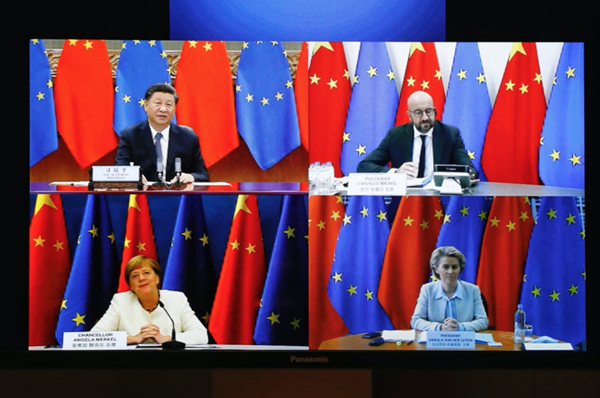China's supply chains and 're-shoring' under Covid-19?

A Covid-safe conference call of Xi Jinping, Charles Michel, Angela Merkel and Ursula von der Leyen (Photo: Council of the European Union)
Due to the impact of the Covid-19 on global supply chains, some European companies have had difficulties sourcing much-needed raw materials from China.
Hence, some in Europe are calling for re-shoring or near-shoring the supply and industrial chains of such critical sectors as medicine and pharmaceuticals, in order to reduce dependence on China's supply chains and market. I also want to share a few thoughts here.
First, the current global industrial layout is a manifestation of the objective laws governing economic operation.
The industrial landscape of China and the EU is primarily a result of the optimal allocation of global resources based on market rules.
China has abundant and high-quality human resources, well-developed infrastructure and supporting industries, and a huge market with robust demand.
At the same time, the Chinese government continues stepping up efforts in reform and opening up, and keeps improving the business environment. The above factors have made China an attractive place for European companies to invest and build their industrial chains.
To rashly move the industrial chains away from China in disrespect of economic laws will substantially increase production costs and weaken the global competitiveness of European companies, ultimately hurting Europe's own interests.
The recent trade and investment data show that European entrepreneurs are cool-headed and rational.
Jacques Aschenbroich, CEO of the French automotive supplier Valeo, said that if the auto industrial chains are arbitrarily moved from China to Europe, the downstream assembly plants will probably be reluctant to bear the high costs.
He also indicated that the global automotive supply chains are resilient enough and are not as vulnerable as imagined.
Second, China is also dependent on the EU supply chains in many sectors.
Thus I would prefer to use the word "interdependence".
The relationship between China and the EU is in fact characterised by positive interdependence, with highly intertwined interests.
For example, in producing the ventilators used for Covid-19 patients, China imported a large proportion of the core components from Europe.
Whether China could produce sufficient life-saving equipment on time depends on whether Europe could offer the components in time.
According to Eurostat, in 2019, the EU accounted for more than half of China's imports of vehicles and auto parts, and aircraft and accessories.
The positive interdependence between China and the EU serves their best interests in this era of globalisation. It is neither factual nor helpful to overemphasise the EU's dependence on China while overlooking the positive interdependence between the two sides.
Third, China's industrial chains and markets have created huge benefits and new sources of growth for European companies.
For example, it is with the help of Chinese equipment and raw materials that German facial mask manufacturers have substantially increased their production capacity at lower costs, contributing to Europe's response to the Covid-19 outbreak.
The automotive industry, a core industry in Europe, has made enormous profits and gained amazing opportunities in the Chinese market.
According to statistics, in 2019, 28.6 percent of the new BMW cars were sold in the Chinese market which was the largest market for the company for the eighth consecutive year.
China contributed nearly one-third of the BMW's net profits of €5bn.
In the same year, Volkswagen's new car sales in China accounted for 38.59 percent of its global sales and the company earned €4.4bn with its Chinese joint venture, accounting for a quarter of its global profits.
As the European auto industry was hard hit by the Covid-19, the Chinese market offers a bright spot.
As some European companies rightly suggest, it is unwise to move away from China's industrial chains and markets.
Xia Xiang is minister of the economic and commercial office of the Chinese Mission to the EU.

 Login
Login Login
Login CCCEU and Gunnercooke Successfully Host Webinar on CSDDD and FLR Compliance to Guide Chinese Businesses
CCCEU and Gunnercooke Successfully Host Webinar on CSDDD and FLR Compliance to Guide Chinese Businesses Cultivating responsible China-EU business leaders essential to tackling global challenges
Cultivating responsible China-EU business leaders essential to tackling global challenges



